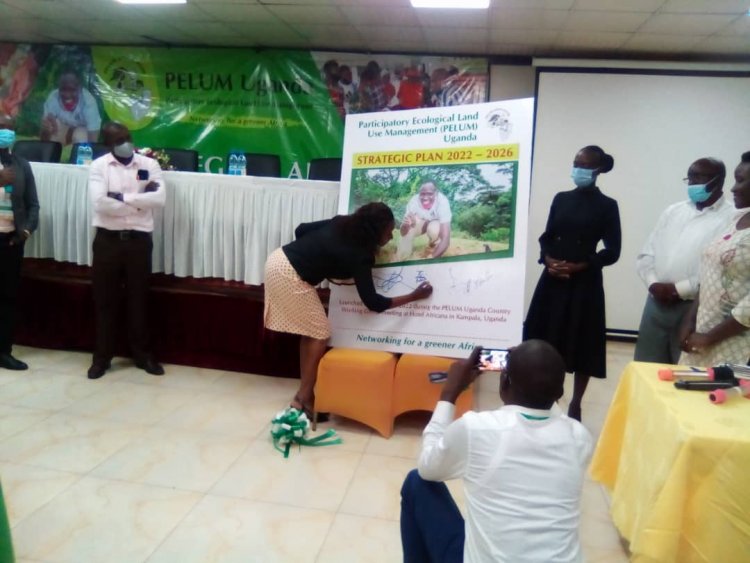PELUM launches a new strategic plan to boost market linkages and improve livelihoods of agroecology farmers in Uganda.

Participatory Ecological Land Use Management (PELUM) Uganda has launched a Strategic Plan 2022 – 2026 to focus on a new direction for the network especially in deepening interventions on Agroecology through the promotion of sustainable natural resources management.
The strategic plan was launched today 28th April 2022 at hotel Africana Kampala.
Dr. Owach Charles who represented Food and Agriculture Organization (FAO) Country Director Dr Antonio Coredo while reading his speech said that there is need to intensify crop production through agro culture systems that will confront future and current challenges like agroecology which he said is if consensus is reached should be promoted as a modern farming method.
“Transform food and agriculture system into holistic and long term solutions using women l, youth and indigenous people to enhance and deliver contextual solutions to local people” he sHe said that the major reason why over 90% of crop varieties have disappeared is because of unsustainable production but added that through agroecology it’s possible to grow a varieties of crop while sustaining the environment.
According to Dr. Christopher Kyeswa, Chairman, Board, PELUM, the Strategic Plan was developed from experiences, lessons learned, and demands of the people PELUM Uganda serves through the network of her members.
“To ensure that interventions and engagements of PELUM remain relevant to the new and emerging trends in development for the next five-year period, the strategic plan was developed through a consultative process and experience and lessons learned from the previous period” he said
The Chairman said that in the new plan PELUM will deepen action on agroecology through linking farming communities including producers and consumers to Agroecological markets and improving governance of natural resources.
He added that the Strategic Plan has been aligned with the aspirations of the third National Development Plan (NDPIII), Uganda’s vision 2040, and the United Nation’s Sustainable Development Goals (SDG) to ensure its relevance.
Francis Nsanga, Lead, Implementation with Knowledge Hub for Organic Agriculture in Eastern Africa (KHEA), said that while working with PELUM as an implementing partner in Uganda, KHEA during the implementation of the strategic plan is going intensify the collection of Organic knowledge and avail it to farmers through available knowledge hubs and a new one to be commissioned.
He said that they are also going to build capacity of farmers and network through the value chains actors through training master trainers in Uganda as multiplier targeting 72000 farmers.
“We shall intensify the collection and assembling of knowledge on Organic agriculture and avail it to farmers through available and a new hub to help farmers improve their capacity” he said
The PELUM Uganda Strategic Plan focuses on Nurturing our Agro-Ecosystems for Sustainable Livelihoods and Profitable Income for Generations with a goal to enhance improved livelihoods and resilience capacity of farming communities in Uganda.
Driven by the core values of Accountability and transparency, Professionalism, and Innovation; this strategy according to the Chairman will contribute to the achievement of PELUM Uganda’s vision of Empowered and Resilient smallholder farming Communities Sustainably utilizing their natural resources.
The Head of Programmest PELUM Uganda, Joshua Aijuka highlighted the achievements in the previous strategic plan period including establishment of a sustainable system of community seed banking where over 60,000 farmers participated, strengthened capacity of farmers to manage plant resources, created the coo book for Ugandan traditional foods profiled in different delicacies in Uganda, promoted the conservation of wild foods sources among others.
Participatory Ecological Land Use Management (PELUM) Uganda is part of the PELUM Association, a regional network of over 280 Civil Society Organizations in 12 countries in East, Central, and Southern Africa working in the area of participatory ecological land use management.
The Association works to improve the livelihoods of smallholder farmers and the sustainability of farming communities, by fostering ecological land use management.
Country chapters include Uganda, Kenya, Tanzania, Rwanda, Malawi, Zambia, Zimbabwe, Lesotho, Botswana, South Africa, Swaziland, and Ethiopia.
PELUM Uganda was constituted in 1995, as a network of like-minded Civil Social Organizations working to improve the livelihoods of smallholder farmers and the sustainability of rural communities through fostering ecological land use management.
The network has since grown in number and influence to currently 66-member organizations operating in 122 districts in Uganda reaching approximately three million farmers (3,000,000) smallholder farmers.












